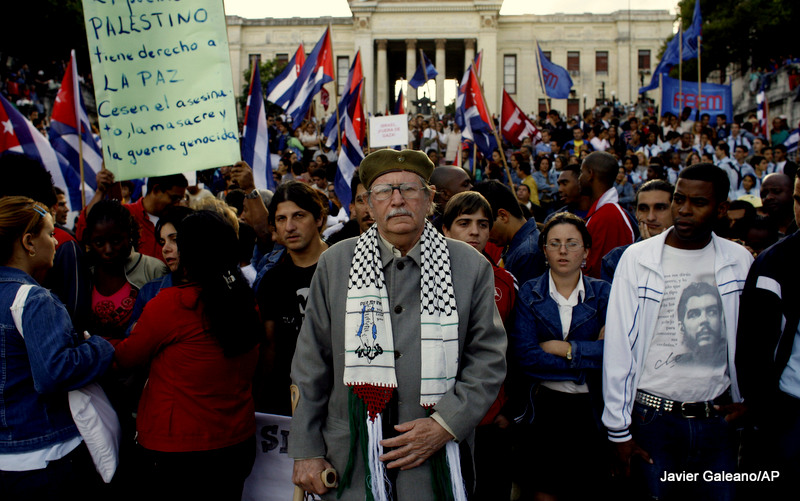
On Aug. 21, the Cuban state newspaper Granma published an article by revolutionary leader Fidel Castro detailing the recent meeting with Venezuelan President Nicolas Maduro. The article, titled “True Friendship,” is another profound reflection on internationalism’s role in combating the repercussions of colonial and imperialist violence.
Of particular significance is Fidel’s discussion of Israel’s recent colonial massacre in Gaza, filtered through a Latin American, socialist and internationalist lens. As in previous reflections, Fidel’s perspective offers an alternative glimpse into the manipulation of events not just in Palestine and Venezuela, but around the world. Weaving an account that encompasses historical consequences and current events, Venezuela emerges as a key player in facilitating humanitarian aid within a political perspective. It is this aspect which makes Venezuela’s offers of aid stand out from the rest — the acknowledgement of political ramifications as part of the process that will determine the rebuilding of Gaza and the well-being of Palestinian citizens.
Indeed, U.N. Secretary General Ban-Ki Moon disgustingly imparted an ultimatum upon Gaza, stating that international aid for rebuilding would be given, but it would be “for the last time.” This hypocritical attitude once again divests Israel and the international community of accountability and responsibility for the genocide perpetrated by Israel in the Palestinian enclave. Rather than denting Israeli impunity, Ben preferred threatening Palestinian civilians with perpetual displacement, destruction and the absolute collapse of basic services.
There are various similarities that can be gleaned from Fidel’s article, notably with regard to imperialist oppression, destabilization, economic blockade, and the anti-colonial and anti-imperialist struggles. In “True Friendship,” Fidel discusses the shifting consciousness among the masses, asserting that Israel’s genocidal actions have raised awareness about the gruesome political hegemony epitomized by the settler-colonial state and the United States.
A perfect example of a force of resistance out of the imperialist entity’s reach, Fidel’s words are of paramount importance, in particular when considering the struggles against imperialism, albeit with different endings, experienced by Cuba, Palestine and Venezuela. As Fidel states, there is hardly any need to look back to centuries of history to discern the nature of colonial, neoliberal and imperialist expansion. Latin America’s decades-long struggle with imperialist interference, according to the revolutionary leader, bears “no resemblance to the chilling scenes witnessed today in images, seen by all citizens in their homes on television. Politicians are rattled and chaos is evident in world politics.”
Cuba’s anti-colonial and anti-imperialist revolution rendered the island a point of reference for various countries around the world enduring similar oppression. Only a few months following the triumph of the Cuban Revolution, Ernesto “Che” Guevara visited Gaza on June 18, 1959, sharing resistance strategies with Palestinians involved in the anti-colonial struggle.
The staunch support for Palestine was later reflected in ties between Cuba and the Palestine Liberation Organization, as well as other resistance factions such as the Popular Front for the Liberation of Palestine and the Democratic Front for the Liberation of Palestine. While armed struggle was a common factor uniting both countries, historical narratives differed enormously. Cubans rallied around a leader who was able to implement a revolutionary program following the defeat of colonialism. On the other hand, Palestinian resistance was embraced by the masses. Yet, Palestinian leaders became entrenched between the need for recognition and the duplicity of concessions, thus diminishing the prospects of a unified front against the imperialist-supported Zionist settler-colonial expansion.
Both Cuba and Venezuela are currently facing manifestations of political destabilization in various forms, instigated by the U.S. in attempts to foment unrest among citizens — the repercussions of which are more strongly felt in Venezuela. As in the months prior to Salvador Allende’s 1973 downfall in Chile, economic sabotage is again gaining ground in right-wing narratives. However, the attempts at destabilization in Venezuela have taken on a sinister twist, with the opposition clamoring about alleged shortages as Maduro upheld the late Hugo Chavez’s internationalist stance in favor of Palestine.
During the same time that Maduro announced the extent of humanitarian aid being sent to Gaza as a means of countering the atrocities inflicted upon Palestinians during Operation Protective Edge, Agence France-Presse published an article alleging a lack of medical supplies. The article quoted Carlos Rosales, head of the Venezuelan Association of Clinics and Hospitals, as stating, “We ask the national executive to declare a humanitarian emergency in the (health) sector in the face of the worsening shortages and irregular delivery of supplies, medicine, surgical materials, medical equipment and reserve supplies.”
In Rafah, the Israeli airforce had threatened the Venezuelan delegation by bombing the vicinities where aid was being delivered to the Palestinian people. The aggression was described by Juan Antonio Hernandez, Venezuelan ambassador to Egypt, as “an act of intimidation, which is not a coincidence and it proves that Tel Aviv is trying to halt Palestinian aid.”
When Fidel refers to the chaos evident in world politics, he’s making a calculated reference to the imperialist intent of fomenting permanent instability. While countries opposed to imperialism have insisted upon interpreting freedom through their particular circumstances, recent years have been witness to an increased trend of imperialism that imposes the rhetoric of freedom. The ensuing chaos is a result of the changes in warfare — notably, a constant imperialist infiltration that is hardly covert anymore, with the U.S. funding various entities responsible for committing atrocities against populations of previously resistant countries.
Of course, the rhetoric behind such widespread oppression remains “freedom,” juxtaposed against U.S. funding of allied groups. Meanwhile, freedom from imperialism becomes an illusion, due to imperialism itself dictating the parameters, process and implementation, which bolsters the mainstream narrative — that of the alleged necessity of the so-called “humanitarian intervention” to restore “stability.” In other words, creating dependency to evoke further turmoil remains a priority for imperialism, which will, in turn, continue to exert various means of retaliation against internationalist solidarity and resistance.

